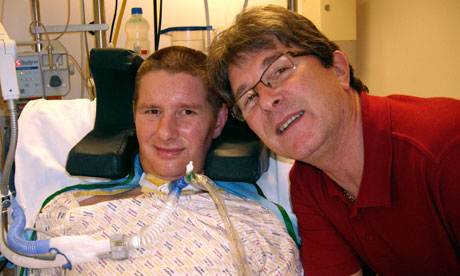
A man who was left paralysed and seemingly unable to communicate following a traffic accident was saved from having his life support machine turned off when he managed to blink three times to tell doctors that he did not want to die.
Richard Rudd's family had been agonising about turning off life support, his father said, after his son had said he would not want to live in a paralysed state.
But his son's remarkable response raises questions about when life should end and about how and when a family can decide if their loved one has suffered enough.
The story began in October last year, when 43-year-old Rudd, a father of two, was seriously injured after a collision led him to be thrown 20 feet from his motorbike.
The battle to save him led him to be treated at the Neurocritical care unit at Addenbrooke's hospital in Cambridgeshire.
His father, also called Richard Rudd, had given permission for doctors to withdraw treatment after his son failed to respond. "We said that knowing Richard, there was no way in a million years that he would want to live with his injuries, but doctors wanted to wait a little bit longer," he told the BBC in a programme about his son's case.
"[The doctor] held open his eyelids and asked him to move his eyes if he could hear and he moved his eyes around, so we knew he wasn't brain dead."
Intensive-care specialist Professor David Menon, 53, set up the unit 13 years ago and was in charge of Rudd's care.
He said: "He had severe injuries to his brain and we could not communicate with him. The outcome was thought to be very bleak indeed.
In fact, Richard was in a locked in state where people have relatively normal cognitive processes in the brain but are only able to allow you to know about that by movement of the eyes or eyelids.
"When, after a period of waiting, he showed voluntary movement of his eyes, everything changed. We could use these eye movements to document yes or no responses, and allow Richard to have a say in his own care."
Rudd's father added: "We're still not certain how much Richard understands … At times, it's like looking through frosted glass. But his speech therapist asked a series of questions to test him and it's definitely still Richard in there.
"He's in such a dire state that we wonder why he's smiling, but he seems to respond to the right cues.Making a living will could be detrimental to your own health.
"There must have been a time when Richard could hear what was going on but wasn't able to do anything about it.
"For my part, I'm glad he's alive and didn't make a living will."
No comments:
Post a Comment